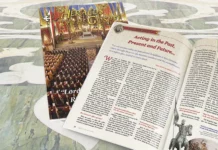Since man is composed of body and soul, more harmful than the evils that affect the body are those that afflict the soul. How often we forget this reality!
For almost two years now, humanity has been afflicted by a new virus. Consequently, the concern with health is highly in vogue in our days, prompting many to seek to inform themselves about the most recent diseases, as well as the means of prevention.
However, very often we forget that, much more harmful than the illnesses that affect the body, are those that have consequences on the soul, because, while the former can result in temporal death, the latter lead to eternal condemnation.
An age-old disease
After the fall of our first parents – which many consider to have taken place about seven thousand years ago – man’s integrity, both physical and spiritual, became seriously impaired. Indeed, the unruly passions and the inclination to evil, now present in all the inhabitants of this vale of tears, did not exist in the soul of Adam and Eve before original sin.
But from then on, a certain oft-forgotten disease began to afflict humanity: pretentiousness. Because of its seriousness and broad scope, it could well be considered as a veritable spiritual pandemic.
What is pretension?

In a broad sense, a pretension is simply “a claim or assertion of a claim to something.”1 However, we can distinguish between two different kinds.
In the first place there is a positive meaning, that is, the legitimate attitude of one who, in keeping with his qualities, aspires to an end that is proportionate to him, using the appropriate means to achieve it.
Thus, a student who graduates from medical school has, for example, the right to claim the title of doctor and to aspire to become successful in this profession.
In most cases, however, this term is used in a negative and even pejorative sense. Why is this so?
The vice of pretentiousness
Contrary to what some may suppose, the vice of pretentiousness is not linked to economic prosperity. The rich man is not necessarily pretentious, and to be pretentious it is not necessary to be rich… An example of this is found in St. Lazarus, the friend of the Lord, of whom tradition says that he was a man of many possessions.
Nor is it to be confused with the desire for perfection and greatness, provided these are in keeping with reality.
The root of pretentiousness is found in pride, the fruit of man’s interior unruliness, through which his desires often tend towards objectives that are not fitting for him or are not within his reach. Because of this, he begins to live an imaginary reality, with which he seeks to deceive himself or others. This is the pretentious person, in the full sense of the term.
There are some cases in which the pretentious person does in fact possess certain abilities or gifts, but exaggerates them to extremes that are no longer realistic, and begins to long for an achievement that does not correspond to him.
So how can one wish to be great without falling into such exaggerations?
Magnanimity, humility and presumption
In treating of fortitude, St. Thomas Aquinas lists magnanimity as one of its annexed virtues. The latter is precisely that which establishes “the mode of reason in great honours,”2 that is, it enables man to desire admirable things without, however, falling into the vice of pretentiousness or pusillanimity.

In effect, a sin can result from both exaggeration and deficiency. Pretentiousness is the deviation by excess,3 while pusillanimity is by lack, for “just as presumption makes a man exceed what is proportionate to his power, by striving to do more than he can, so pusillanimity makes a man fall short of what is proportionate to his power, by refusing to tend to that which is commensurate thereto.”4
Therefore, a humble and unpretentious attitude does not consist in rejecting every aspiration, but in desiring one’s due, according to God’s will.

In this sense, the lives of the Saints give us a continuous lesson. After all, how can we deny that figures like St. Paul, St. Bernard, St. Teresa and so many others successfully aspired to great goals? But what made their works not only lawful but also full of merit is that they did them for the greater glory of God, without any self-seeking motives. This is the thermometer of pretentiousness.
Accordingly, if I pursue glory for myself, the fever of pretentiousness has surely begun to provoke its delirium in my interior. However, if I aspire to accomplishments – even disproportionately great ones – for the glory of God, it is not the fever but the fire of divine love that burns in my soul.

But how can I recognize whether I am being motivated by charity or by self-love? How do I know whether I am acting pretentiously or unpretentiously?
The symptoms of pretension
In natural diseases, the perception of symptoms can give us a precise notion of the ills that afflict the body. In supernatural maladies, this means is also of great value.
Based on his experience in the direction of souls, Dr. Plinio Corrêa de Oliveira “diagnosed”, in a conference held in 1969,5 some of the “symptoms” of pretension, in order to facilitate his followers’ discernment about the existence of this vice in themselves.
Although there may be other symptoms not named here, or some of them may be recognized in more than one supernatural ill, the examination of all of them will give the reader a clear idea of the degree of development of the “disease”.
Agitation
“Agitation is not produced by pretension alone, but the latter always produces the former,” Dr. Plinio explains.
Those who suffer from the aforementioned vice try to impose their high opinion of themselves on others. And, as a result of this effort to cause a good impression, they become tense and agitated.
Let us imagine, for example, a speaker who before delivering a lecture begins to feel a strange excitability. Could this not be the fruit of a certain hidden vanity, which longs to fulfil itself in unfounded glory? It is a valid question to ask oneself…
In contrast, the unpretentious soul measures itself accurately: it is what it is, with its qualities and limitations, and in this regard it is neither ashamed, nor troubled. Such an interior attitude creates strong stability.
Apprehension
The second symptom is apprehension.
Someone might object: is that not the same as agitation? No. If someone wins a large fortune in the lottery, he may certainly become agitated. Perhaps he will be so happy about it that his first reactions after hearing the news are out of control. But would anyone say that he is apprehensive? Dr. Plinio does not think so, because apprehension is always produced by some fear.
Since the presumptuous person is afraid of not achieving his objectives or of not staging his pseudo-reality well, he is afflicted by such a difficult task. Furthermore, because he is never satisfied with the glory received, even if he achieves a certain result, he will soon wish to obtain twice as much. Since, however, he instinctively perceives that there is a great risk of not attaining it, he becomes apprehensive.
In short, while agitation comes from the desire to appear to be more than one is, apprehension arises when this goal seems too difficult to achieve, making failure imminent.
On the other hand, the unpretentious soul experiences a great serenity within itself, because he knows that every human being is dependent by nature and that, without divine help, he works will never be as perfect as he would wish. Consequently, he does all that is within his power, but without affliction. What is not possible for him, will be possible for his Lord because, after all, “with God all things are possible” (Mt 19:26).
Irritability
The third symptom of pretentiousness is irritability.
In the same way that the pretentious person worries about the possibility that his false image will not receive the desired recognition, when he perceives that his projects of realization have been tarnished, even slightly, he is inclined to become irritated at that failure.
Let us imagine a person who imagines himself to be much finer looking than he is in reality. When he hears a criticism of his appearance, he becomes intensely irritated at the impolite comment.
Or let us suppose that someone else considers himself the greatest athlete in his city. If another sportsman is congratulated in his presence, he will easily become irritated. Dr. Plinio imagines, not without a certain jocularity, what would pass through the mind of someone like this: “How can they compliment him before me, the star and phoenix of athletes? How dare they praise him, who is but a drop of water beside the sea that I am?”
Why this irritation? In his soul the fever of pretension tends to cause fits of anger.
If, instead, the gentle breeze of unpretentiousness murmurs within him, he will know not to become irritated in face of affronts, which will always be less than those suffered unjustly by the Redeemer in His Passion. Therefore, like the Divine Master, the faithful disciple becomes “meek, and humble of heart” (Mt 11:29). He is always affable.
Suspicion
“The person who hides something is always suspicious,” observes Dr. Plinio. A pretentious individual hides his lack of courage; therefore, because he fears that others will perceive his farce, he distrusts everyone and everything.

He could be likened to someone who was born with only one ear. To remedy this situation, he was fitted with a wax ear so well made that that it was very close to the natural one. However, someone would only have to look a little more closely to notice, ipso facto, that they were looking at a fake ear. The same risk is constantly faced by those who create a mask of pretence for themselves.
However, one who lives without such a mask ceases to be continually worried about himself and, in a discerning way, learns to analyse everything with detachment; dispassionate, tranquil and without fears.
Applause-seeking
The fifth symptom is “applause-seeking”.
The pretentious person wants to win, and in his “inner stadium” he is continually stoking the applause for his victory. Receiving this applause, he is not satisfied with the results achieved, but always wants to increase his glory and prestige: he would like to see them doubled, tripled… to infinity.
Take, for example, a person who would like to be regarded as an excellent conversationalist. Let us suppose that, through a huge effort, repeating things he heard from others and imitating others – a series of “wax ears” – he manages to achieve a result far superior to his natural ability. He will not be satisfied, and will soon want to obtain much more! The result: he will live in a permanent state of applause-seeking.
Nevertheless, no one will be any better or worse for having been acclaimed much or little. It is, rather, more of an irrational need than a logical means to reach an end.
On the contrary, whoever trusts and has faith will move mountains (cf. Mt 17:20). In short, the unpretentious person does not seek ovations; he prays.
The solution
These are the most relevant symptoms of pretentiousness and, consequently, of unpretentiousness. They are not listed in chronological order, perhaps due to the many variants of this illness from patient to patient.
Besides, one symptom is almost always accompanied others, in such a way that they are difficult to separate in practice.
However, those readers who have detected any of these symptoms in their soul should not despair. Rather, they should trust all the more in Him who did not come “to call the just, but sinners” (Mt. 9:13) and ask Him, through the intercession of His Blessed Mother, for deliverance from this ailment, certain that, however long it may take, one day the cure will come! ◊
Notes
1 PRETENSION. In: Oxford Dictionary of English, ed.3, Oxford: Oxford University: Press, 2010, p.1406. Under the same entry, other meanings follow which will be explained subsequently.
2 ST. THOMAS AQUINAS. Summa Theologiæ. II-II, q.129, a.3.
3 Cf. Idem, q.130, a.2.
4 Idem, q.133, a.1.
5 Cf. CORRÊA DE OLIVEIRA, Plinio. Conference. São Paulo, March 11, 1969.







